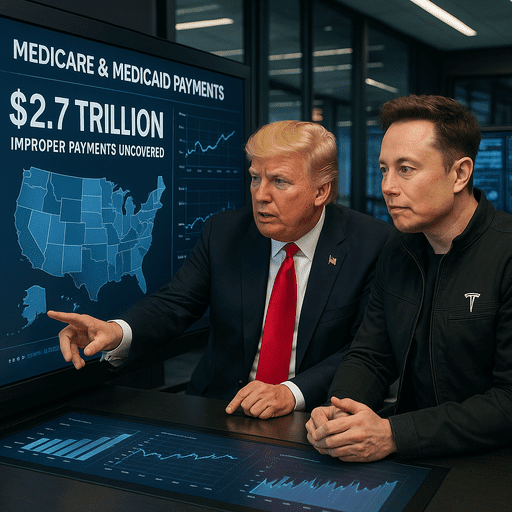In a decisive move to enhance governmental efficiency, President Donald Trump has established the Department of Government Efficiency (DOGE), led by Elon Musk. This initiative has recently identified $2.7 trillion in improper Medicare and Medicaid payments since 2003, underscoring the administration’s commitment to fiscal responsibility.
The DOGE subcommittee, chaired by Representative Marjorie Taylor Greene, held a hearing titled “The War on Waste: Stamping Out the Scourge of Improper Payments and Fraud.” The session revealed that a significant portion of these improper payments were disbursed to ineligible individuals, including those residing overseas. This discovery highlights the necessity for stringent oversight mechanisms within federal programs.
President Trump’s executive order mandates all federal agencies to review contracts and grants for potential waste, fraud, and abuse. Agencies are required to justify expenditures and make payment information publicly accessible where feasible. Additionally, the General Services Administration (GSA) is tasked with formulating a plan to dispose of unnecessary government-owned or leased properties, aiming to streamline operations and reduce costs.
The administration’s focus on efficiency has led to the termination of numerous contracts across various departments. For instance, the Department of Education canceled over $600 million in grants associated with divisive training programs. Similarly, the Department of Housing and Urban Development (HUD) launched a DOGE Task Force to scrutinize spending and has already identified over $260 million in potential savings.
While these measures are designed to eliminate waste, they have also resulted in operational adjustments. Agencies like the Social Security Administration and the Internal Revenue Service have experienced staffing changes and technical challenges as they adapt to new directives. These transitions are part of the broader effort to ensure that taxpayer dollars are utilized effectively.
The Department of Justice is collaborating with DOGE to collect referrals for criminal fraud investigations, emphasizing the administration’s dedication to accountability. Attorney General Pam Bondi has affirmed the department’s commitment to prosecuting fraudulent activities within the federal government.
In line with these efforts, the Environmental Protection Agency (EPA) has canceled grants totaling at least $2 million designated for environmental justice initiatives. This realignment reflects the administration’s priority to reassess and redirect funding to align with current objectives.
The administration’s actions have also included the dismissal of several inspectors general, a move aimed at restructuring oversight to better align with the new efficiency goals. This approach seeks to modernize and streamline government operations, ensuring that oversight mechanisms are both effective and responsive to current needs.
These comprehensive reforms are part of a strategic plan to enhance the efficiency and effectiveness of federal agencies. As these initiatives progress, the administration remains focused on refining processes to better serve the American public.
—
Greg Sanders covers federal oversight, administrative restructuring, and the mechanics of government reform. He holds a degree in public policy from the University of Texas and began his career auditing municipal budgets before moving to federal-level investigative reporting. His work focuses on how agencies evolve, consolidate, and expand under the banner of efficiency.



